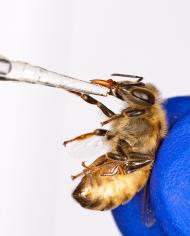ARS's decades long turfgrass research focuses on seed production, disease resistance, and more.
Tellus Articles
No grass: no functioning ecosystems, forage quality lacking; wildlife and livestock would not survive.
The Agricultural Research Service celebrates Earth Day 365 days a year.
Interview with Lisa Ainsworth, molecular biologist at the Global Change and Photosynthesis Research Unit.
Genes in the European corn borer moth can help them survive variable climate conditions.
ARS researchers are looking at ways to control the crop-feasting bagrada bug.
ARS researchers have created an artificial diet to raise the beneficial pink spotted lady beetle.
ARS is helping to solve the problem of 1.2 million acres of abandoned mined land across Appalachia.
Mississippi Delta farmers may reap the benefits for flooding their fields during the fall and winter.
Researchers are studying genetics of the African Baobab tree to determine how to protect it for generations.
How to build and maintain a snow monitoring station using automated trail cameras.
ARS has developed several novel attractants capable of luring in bloodsucking insects--a serious problem in agriculture.
ARS is working with researchers in Ireland to reduce excess phosphorus from fertilizer leaching into lakes and rivers.
The tiny samurai wasp may be a good biological control agent for reducing brown marmorated stink bugs.
Scientists are studying magnetic senses in leaf-cutter ants, a major pest for tropical and subtropical crops.
Microalgae could provide a strong, sustainably produced artificial diet for honey bees.
Have you ever wondered how long a mosquito needs to bite you to pass on a pathogen?
A decade ago, ARS began a project to photograph the effectiveness of an ancient erosion-control technique.
ARS soil scientist Hal Collins is studying the impacts of retaining carbon in soil.
Methyl benzoate is equally effective as both a government-approved food additive and as a pesticide.
ARS researchers are investigating whether insects are involved in the transmission of the SARS-CoV-2 virus.
ARS scientists are always coming up with innovative ways to tackle problems that really bug farmers.
ARS researchers are providing pest management solutions for peach tree growers.
Scientists are using ultraviolet light to kill pests of strawberry and other fruit crops.
An ARS team is studying the effects of biochar on poor-quality or significantly degraded land.
ARS recently developed a strategic vision for improved models to predict erosion and how to control it.
ARS scientists at the Great Basin Rangeland Research Laboratory in Reno, Nevada are researching wildfire mitigation.
ARS scientists examining how nutrients from agricultural lands can affect the water quality of watersheds.
Specially trained canines may be used to detect citrus greening in orchards.
ARS researchers are helping prevent the spread of citrus pathogens.
Trap controls Asian citrus psyllids in citrus trees growing in residential and commercial landscapes.
One of the most aggressive invasive weeds in the southeastern United States may have met its match.
ARS researchers are working to understand the impact of a changing climate on bee health.
ARS research focuses on safe reuse of wastewater for irrigation and groundwater recharge.
An ARS scientist in the Pacific Northwest has joined the hunt for the infamous Asian giant hornet.
New plant contains twice the amount of artemisinin used to manufacture therapies against malaria.
ARS researchers are working to fight the spread of Lyme disease through the control of deer ticks.
ARS launches its first-ever Hackathon against the most challenging agricultural issues.
USDA’s Caribbean Climate Hub has worked overtime to help Puerto Rico and the U.S. Virgin Islands recover.
ARS scientists are studying carbon sequestration.
Scientists with the Agricultural Research Service play a vital role in protecting our environment.
Female monarchs prefer some milkweed species over others.
ARS Electron and Confocal Microscopy Unit helped identify mites found in the highlands of Peru.
ARS entomologist is developing microbial pesticides for the effective control of mosquitoes.
Cute as Can Bee! Learn more ARS honey bee research.
The ARS Bee Research Lab maintains a Pollinator Garden as an educational tool.
ARS research finds cedarwood oil has potential as a natural pest-control agent and wood treatment.
Controlling cheatgrass to restore rangelands, reduce wildfires and increase sustainable grazing resources.
ARS researchers studied bacterial levels in the waters collected by the Upper Oconee Watershed Network.
Hunting for natural enemies of the red imported fire ant is paying off.



















































